
In 2024, How to Transfer Text Messages from Motorola Moto G73 5G to New Phone | Dr.fone

How to Transfer Text Messages from Motorola Moto G73 5G to New Phone
Hi, I have recently bought a new iPhone. Is there any way to transfer my text messages (Inbox and Sentbox) from my old Samsung phone to the new iPhone? I have used the Samsung Kies program to transfer my Contacts, Music, and Pictures, but there is no option within the program to transfer text messages. I would really appreciate any suggestions? How to transfer texts to a new phone? Thanks.
In this article, we are going to introduce a powerful tool to solve the problem above. This tool is MoibleTrans; it will help you to easily transfer text messages to a new phone in 1 click.
Best Way to Transfer Text Messages to New Phone
After getting a new phone, you may transfer text messages with important or sensitive information from the old phone to a new one. Therefore, you can read the text messages on your new phone. To transfer text messages to a new phone, you highly recommend you a one-click phone transfer tool - Dr.Fone - Phone Transfer . It’s mainly used to help you transfer data between phones and tablets running iOS, Symbian and Android. With its help, you can transfer all text messages on your old Android phone, Nokia phone, and iPhone to the new Android phone or iPhone in one click.
Dr.Fone - Phone Transfer
Transfer Text Messages to New Phone in 1 click!
- Easily transfer photos, videos, calendar, contacts, iMessage, and music from an old phone to a new one.
- Works perfectly with Apple, Samsung, HTC, LG, Sony, Google, HUAWEI, Motorola, ZTE, Nokia and more smartphones and tablets.
- Fully compatible with major providers like AT&T, Verizon, Sprint and T-Mobile.
- Fully compatible with the newest iOS and Android.
- Fully compatible with Windows and Mac.
3,053,460 people have downloaded it
Download this tool to try transferring text messages to the new phone. Here, I’d like to give the Windows version a shot. And also, we take data transfer from Samsung to iPhone as an example.
How to Transfer Text Messages to New Phone Step by Step
Step 1. Run this phone transfer tool on the computer
To begin with, install and run Dr.Fone on the computer. The primary window will be shown on the computer screen. Click “Switch”. This brings up the phone transfer window.

Note: To transfer data to or from iPhone (iPhone 8 Plus, iPhone X supported), iPad and iPod, you should install iTunes on the computer.
Step 2. Connect your old and new phones to the computer
As I mentioned above, Dr.Fone lets you export SMS on the old Nokia phone, Android phone and even iPhone, and then copy them to your new iPhone or Android phone. So, connect two phones to do the SMS transfer to the computer with USB cables. After detected, the old phone is shown on the left, named as the source phone, and the new Android phone or iPhone, the destination phone appears on the right.
Besides, “Flip” between two phones lets you change places of the two phones.
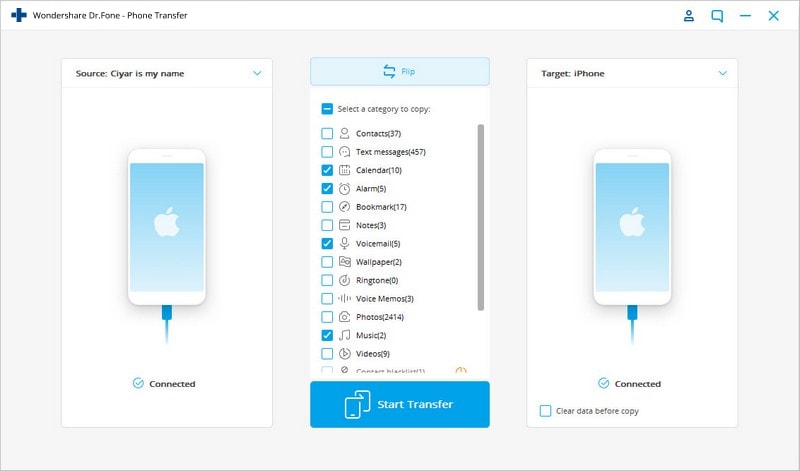
Step 3. Transfer text messages to new phone
Besides text messages, Dr.Fone - Phone Transfer empowers you to transfer other files, like contacts, music, and photos. Therefore, remove the marks before other files when you just want to move text messages to the new phone. Then, click “Start Transfer”. Please never disconnect either phone before the transfer is done. When it’s done, click “OK”. That’s all about how to transfer texts to a new phone.
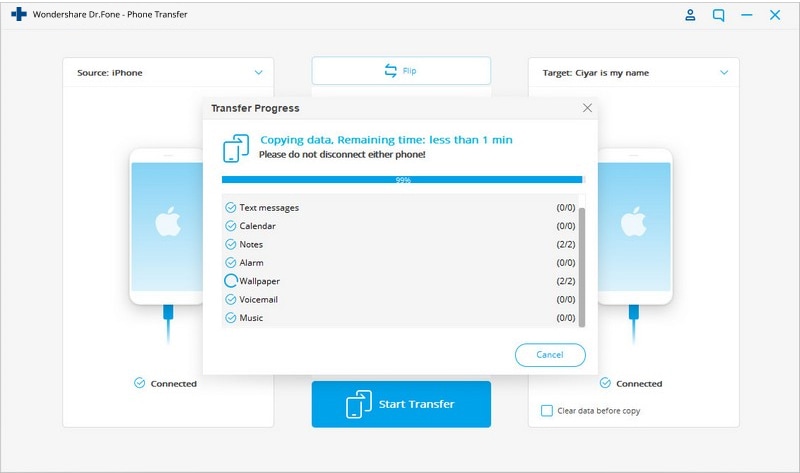
How to Transfer Photos from Motorola Moto G73 5G to Laptop Without USB
Moving your photos on a computer comes with lots of benefits. Among them is the larger screen itself, which allows you to inspect the image details in a more thorough manner. Another thing is that the computer also serves as a great backup storage for your dearly cherished photos. You can be sure that the image folders you create in the computer’s local memory are highly secure. Just organize each file with labels to avoid unnecessary confusion. Simply put, our computers have a lot to offer with regard to file organization and data management.
Many people assume that copying your files to a computer is a bit of a hassle. Well, it’s somewhat true unless you’re going to opt for wireless data transfer. Yes. That’s possible. There are many tutorials out there on how to copy files from your phone to your laptop without USB. Simply choose a particular method that works best in your situation.
In this article, we will provide a short guide on how to organize your computer files easily and quickly. We will also list down a few tutorials on how to transfer photos from your phone to your laptop without USB. Continue reading below to learn more.
How to Organize the Photos on Your Computer
While smartphones offer convenience for snapping photos on the go, viewing your pictures is doubtlessly much better on a computer. Why not? Computers apparently have larger screens that increase image quality to another level. However, finding a specific photo in your desktop storage can be a daunting experience if your files are unorganized. Don’t worry. Listed below are some useful organization techniques that can help you a lot in this regard.
Add the Image Folders to the Photos Application
Many operating systems have a built-in Photos application to help you organize and view your pictures more efficiently. You may use it to organize your photos in separate folders and create a centralized hub for browsing.
Add Tags to Your Photos
Tagging your photos is a versatile way to categorize and organize them based on themes, events, or people. Most photo management applications allow you to add descriptive tags that make it easy to search the media files later. This is particularly useful for quickly locating pictures of specific occasions or individuals.
Keep Your Photos in Separate Folders
Make it a habit to create separate folders for different events, locations, or time periods. This organization method helps you maintain a clear structure for your photo collection. For example, you might have folders for vacations, family gatherings, or special occasions. Organizing photos this way simplifies navigation and ensures that each set of pictures is kept properly.
Rename Your Photo
Give your photos descriptive and unique filenames that reflect either their content or context. Organizing your files by their respective labels helps you find them easily instead of relying solely on visual cues. Consider including dates, locations, or key details in the filenames to make your photos easily identifiable.
NOTE: By incorporating these organization techniques, you can surely enjoy your memory collection on the larger canvas of your computer screen. Take advantage of these methods to transform your digital photo library into a well-ordered and easily accessible archive. Moreover, these are prerequisites for the tutorials on how to transfer photos from your phone to your laptop without USB.
How to Transfer Photos From Phone to Laptop Without USB in Easy Steps
Copying photos from smartphones to laptops has become significantly more straightforward today than in the past. In fact, the entire data migration process can be completed within a few minutes. No need to resort to advanced interventions and external assistance. Just choose a particular tutorial below on how to transfer photos from your phone to your laptop without USB. Initiate each step carefully and complete the procedure in no time. Check out the list below to get started.
Method 1: Transfer photos from phone to laptop using iCloud web
If you’re an Apple user, you can easily transfer photos from your phone to your computer via iCloud. Don’t worry. It’s a very simple data transfer procedure you can definitely complete with little to no effort. Here’s a short guide on how to transfer photos from your phone to your laptop without USB using iCloud.
- Step 1: First and foremost, make sure that your iPhone is syncing your photos to iCloud. To check it, go to Settings > Apple ID > iCloud > Photos. Toggle on the radio button next to Sync This iPhone.
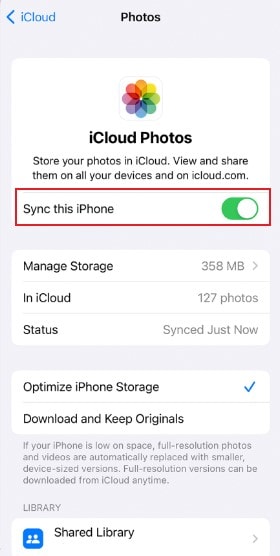
- Step 2: On your computer, launch the Browser.
- Step 3: Visit icloud.com. Once it fully loads up, click Sign In. Log in to the Apple ID account you’re currently using on your iPhone.
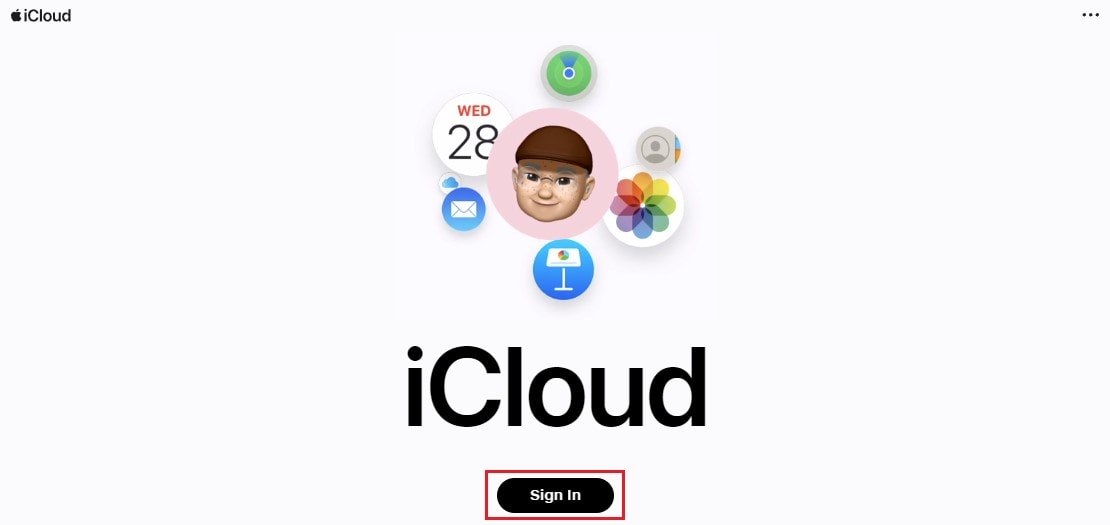
- Step 4: Click on the Photos icon.
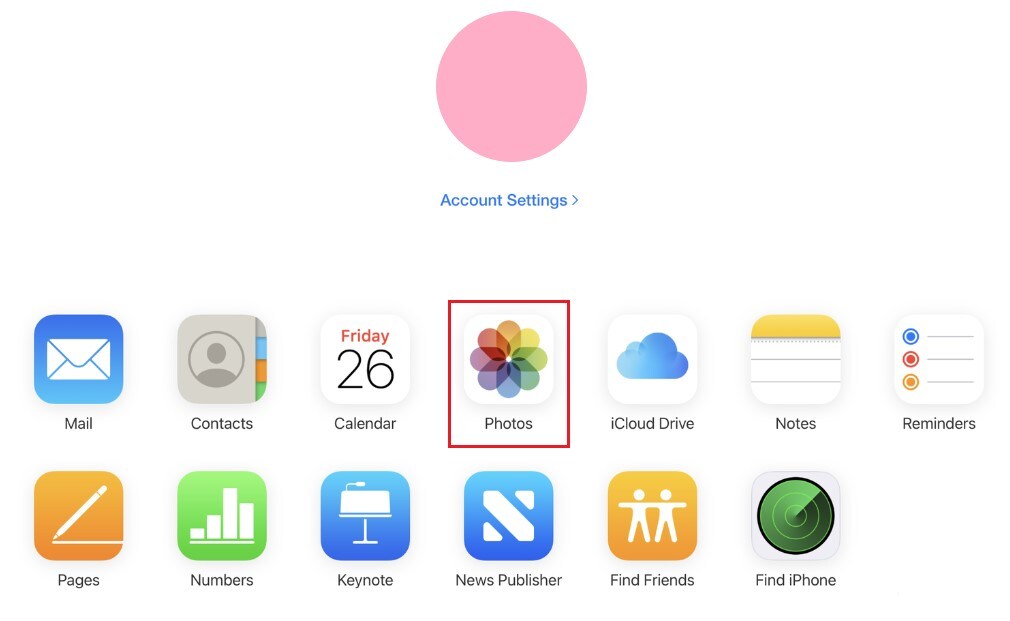
- Step 5: Select the photos you want to transfer to your computer. After that, click the Download icon at the top-right corner of your screen.
NOTE: How to transfer videos from your phone to your laptop without USB? This data migration technique also works in this regard.
Method 2: Transfer photos from phone to laptop using Google Photos
Google Photos is simply the iCloud’s substitute for Android smartphone. Like iCloud, you can sync your Android photos to Google Photos and access them from your computer. Don’t worry. It’s very easy to facilitate. Here’s how to transfer photos from your phone to your laptop without USB using Google Photos.
- Step 1: Before anything else, back up your Android smartphone first to Google Photos. Go to Google Photos > Profile icon > Turn On Backup. Once enabled, Google Photos will copy your photos from the local storage to the Google server.
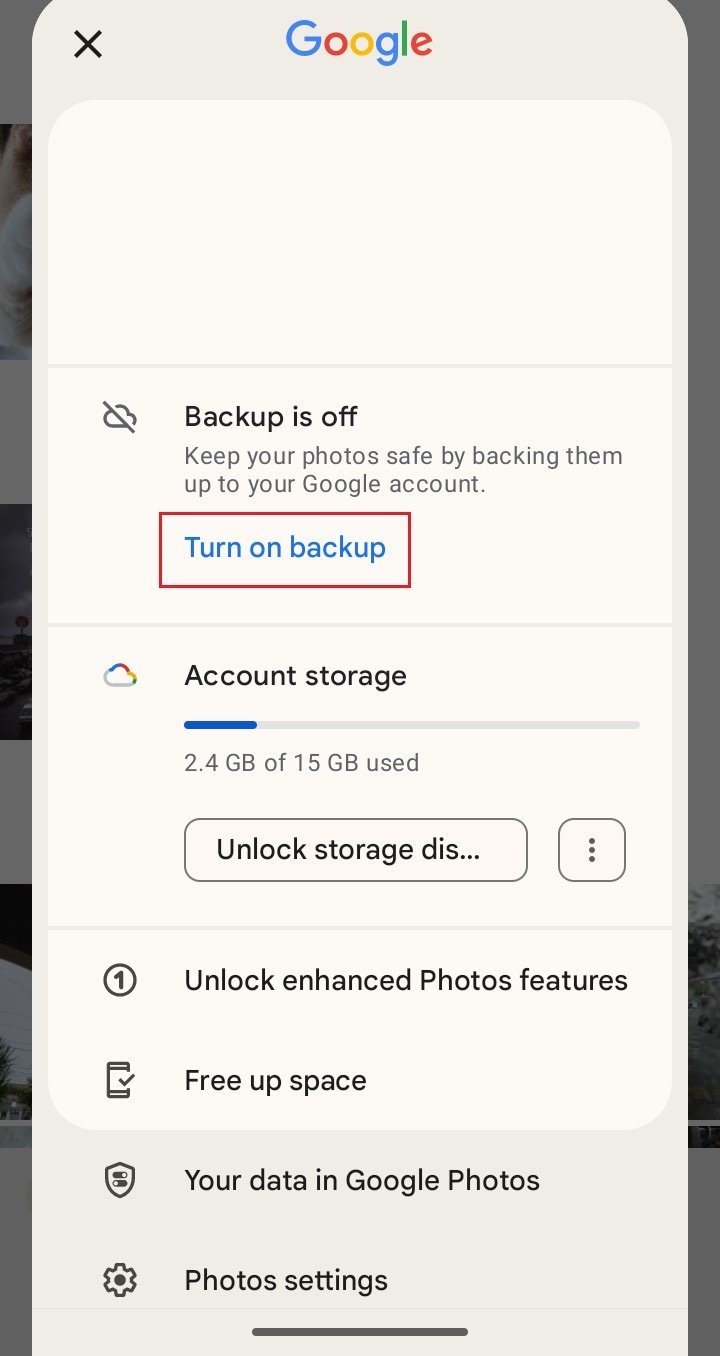
- Step 2: Launch the Browser on your computer. Go to google.com.
- Step 3: Click the Nine-dotted menu icon next to your profile. Make sure that you’re logged in to the same Gmail account you’re currently using on your smartphone.
- Step 4: Choose Photos.

- Step 5: Click the images you want to save on your computer. From there, click the Three-dotted menu icon. Find and click Download or press SHIFT + D on your keyboard.
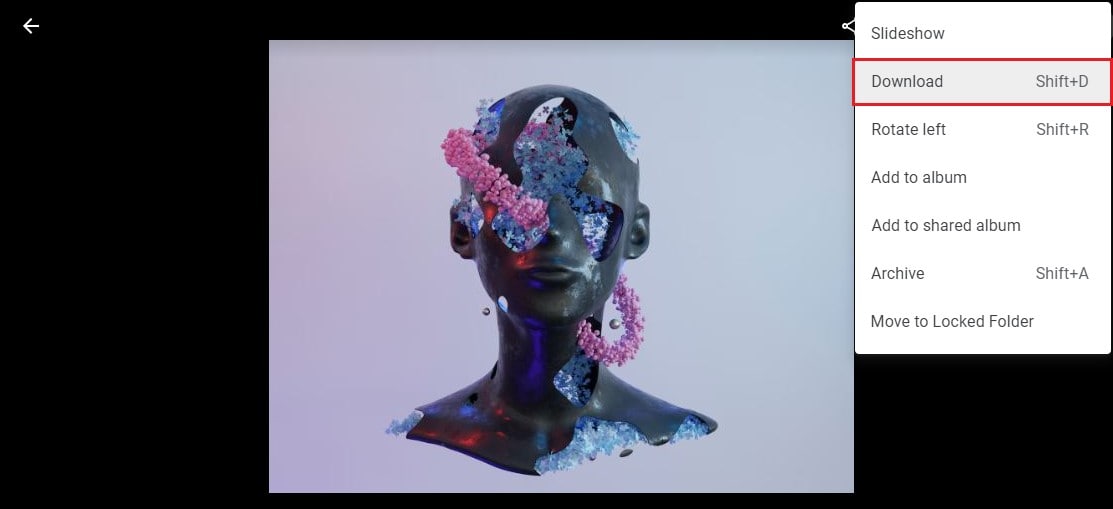
NOTE: How to transfer videos from your phone to your laptop without USB? This data migration technique also works in this regard.
Method 3: Transfer photos from phone to laptop using Bluetooth
Does your laptop have a Bluetooth connectivity feature? If so, try to use it for the photo transfer. Just connect your smartphone to the computer via Bluetooth and go ahead with the migration. Here’s a short guide on how to transfer photos from your phone to your laptop without USB via Bluetooth.
- Step 1: Turn on the Bluetooth connection on your smartphone and your computer.
- Step 2: On your smartphone, select the photos you want to transfer. Click on it.
- Step 3: Click Share.
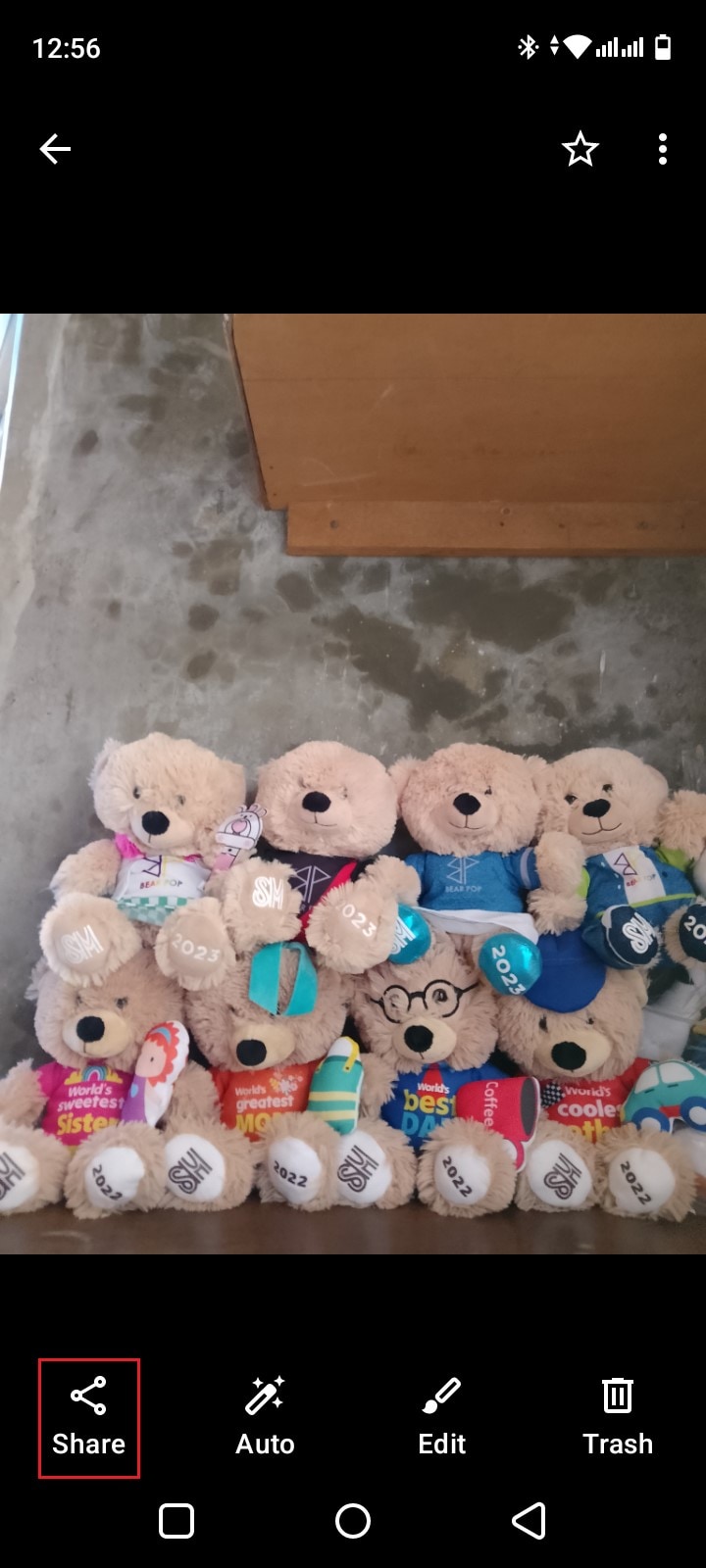
- Step 4: Click Bluetooth. Select your computer from the list. Then, click on it. Wait for the transfer to be completed in a few seconds.
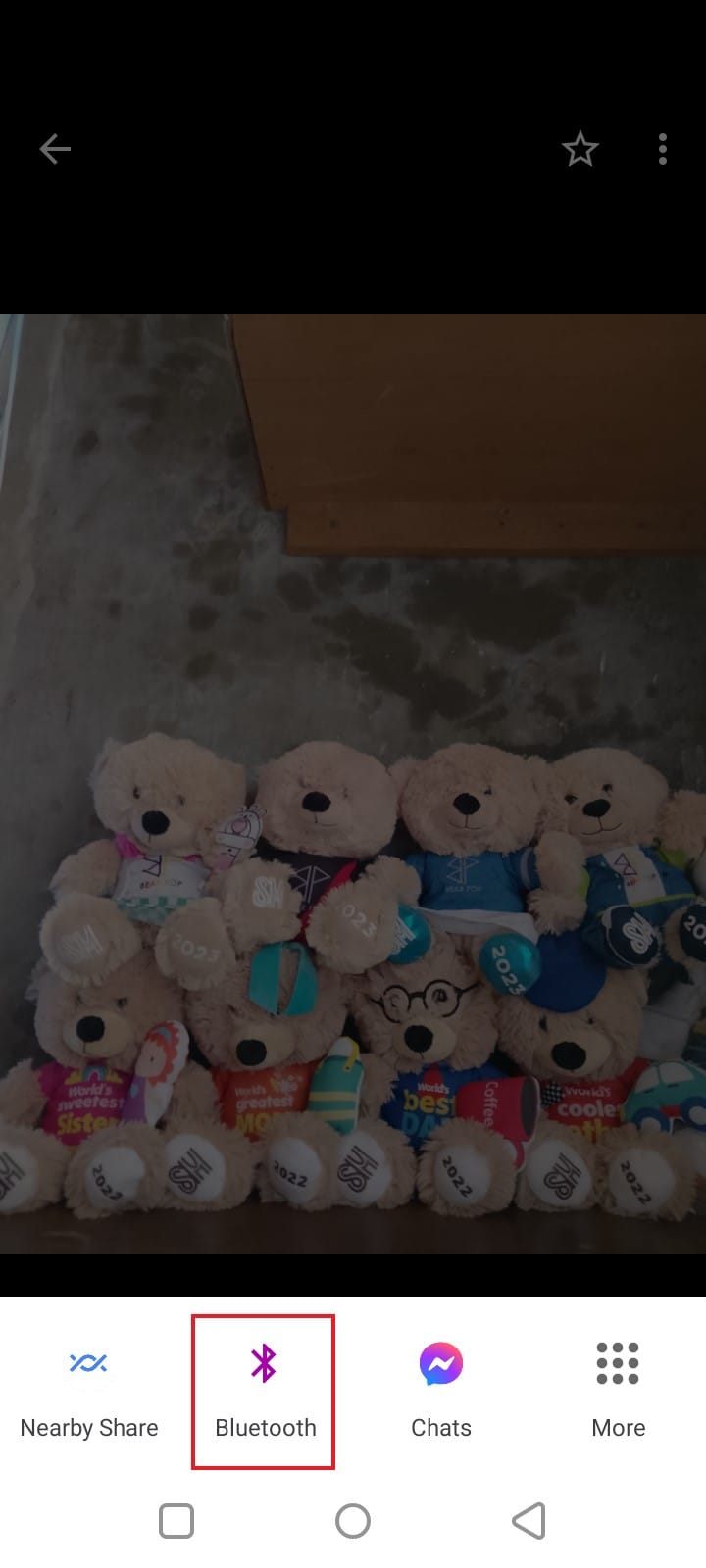
Method 4: Email the photos from the phone to the laptop
If you’re only sending a few photos to your laptop, emailing them from your smartphone will certainly work great. Here’s how to transfer photos from your phone to your laptop without USB via email.
- Step 1: Launch the Gmail application on your smartphone. From there, click Compose.
- Step 2: Key in the recipient’s email address to the To field. Make sure that it is currently logged in to the browser on your computer.
- Step 3: Click the Attachment icon on the top-right corner of your screen. After that, choose the photos you want to transfer.
- Step 4: Click the Send button.
- Step 5: On your computer, launch the browser and sign in to the Gmail account delegated as the receiver of the transfer.
- Step 6: Find and click the Email to view them. From there, hover the mouse cursor over the photo attachment you want to download. Lastly, click the Download icon.
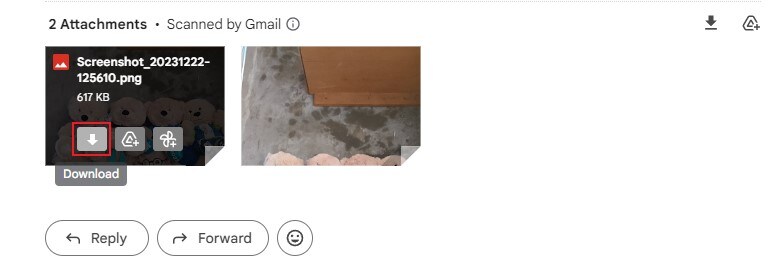
NOTE: How to copy files from your phone to your laptop without USB? This data migration technique also works in this regard.
Method 5: Transfer photos from phone to laptop using AirDrop
Are you using an iPhone and a Macbook? No problem. You may use AirDrop to move your photos between these two devices. Here’s a short guide on how to transfer photos from your phone to your computer without USB via AirDrop.
- Step 1: Activate AirDrop on your iPhone and Macbook.
- Step 2: On your iPhone, go to the Photos application.
- Step 3: Choose the media files you want to transfer. After that, click the Share icon at the bottom-left corner of your screen.
- Step 4: Choose AirDrop.
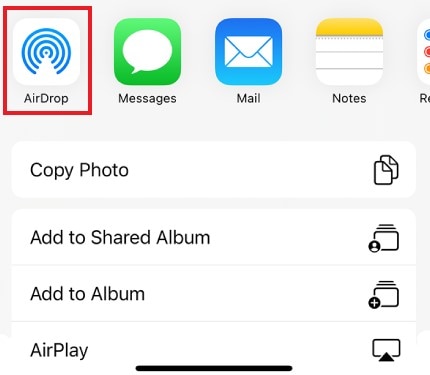
- Step 5: Select your Macbook as the recipient.
- Step 6: On your Macbook, click Accept.
BONUS TIP: How to Copy Files From One Smartphone to Another?
As a bonus, it is important to know that transferring files from one device to another in a secure environment is significant. It safely copies the documents and lowers the risk of data loss and corruption.
With the holidays fast approaching and the abundance of noteworthy photos, videos, and moments coming your way, having a steadfast solution is crucial. This is where Wondershare brings a compact yet efficient tool to help you. Wondershare Dr.Fone lets you quickly transfer photos and files to another mobile device in no time. To back this up, here is a quick, comprehensive guide on how to do it in a few simple steps.
Suppose you’re upgrading to an IOS device and need a quick way to transfer files from your old Android device. Then here’s your go-to guide using Wondershare Dr.Fone.
- Step 1: Open Wondershare Dr.Fone on your computer and navigate to the Toolbox section. Select the Phone Transfer tool.

- Step 2: Once opened, set the Source and Destination devices for the data transfer. Use the Flip button to change the transfer direction between the Motorola Moto G73 5G devices.
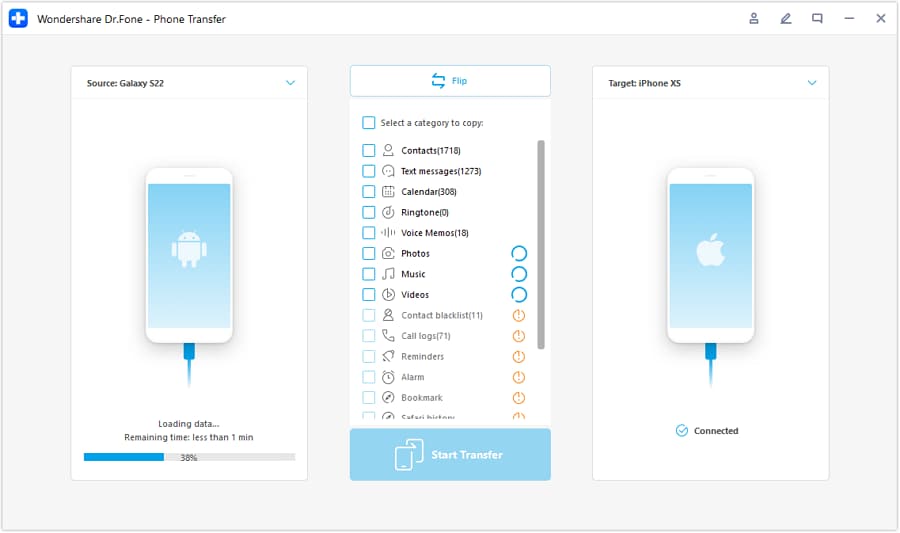
- Step 3: Set the transfer direction from Motorola Moto G73 5G to iOS. Select the specific data types you want to transfer. Checkmark the desired items and click Start Transfer.
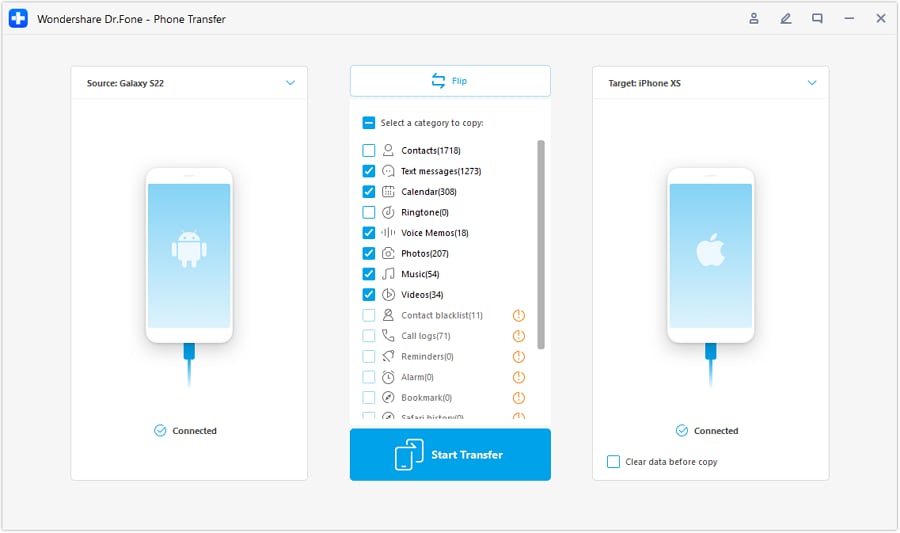
- Step 4: A new window will show the progress of the transfer. If you want to stop the operation, click Cancel.

- Step 5: Once completed, click OK to close the window.
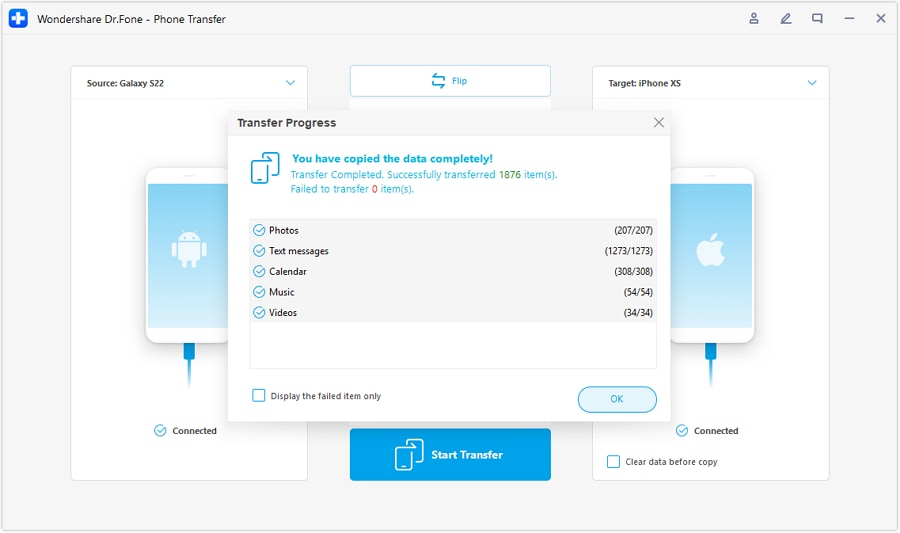
Conclusion
Navigating the digital landscape of photo organization and transfer has become increasingly vital in our fast-paced era. This article showcased various wireless methods, from iCloud to Bluetooth, and offered a step-by-step guide on how to transfer photos from phone to laptop without USB cables. As a valuable bonus, Wondershare Dr.Fone emerges as a trustworthy solution for efficiently transferring photos and files between mobile devices, ensuring a hassle-free experience. As we approach the holiday season, where memories are plentiful, having a reliable tool like Wondershare Dr.Fone can enhance the management of our digital archives, making it easier to cherish and share moments with friends and family.
How to Transfer Contacts from Motorola Moto G73 5G to Outlook
I would like to export/edit my contacts that are on My Motorola Moto G73 5G and get them onto my computer for a back, to edit them, to input/import them into Outlook. Can this be done and how? Is there something I can download or a backup assistant?
With lots of contacts on your Motorola Moto G73 5G, you may want to transfer these contacts from Motorola Moto G73 5G to Outlook for backup. This way, when you get a new Android phone or when you lose contacts by accident, you can quickly get them back.
To sync Android to Outlook, I highly recommend an Android manager: Dr.Fone - Phone Manager (Android) . This program empowers you to transfer contacts on your Motorola Moto G73 5G to Outlook 2003/2007/2010/2013 easily and effortlessly.
Dr.Fone - Phone Manager (Android)
One Stop Solution to Transfer Contacts from Motorola Moto G73 5G to Outlook
- Transfer files between Android and computer, including contacts, photos, music, SMS, and more.
- Manage, export/import your music, photos, videos, contacts, SMS, Apps etc.
- Transfer iTunes to Android (vice versa).
- Manage your Motorola Moto G73 5G on computer.
- Fully compatible with Android 8.0.
4,858,377 people have downloaded it
How to sync Android with Outlook?
Now, I’d like to introduce you how to transfer Android contacts to Outlook. Download this free trial version on your computer. Then check out the easy steps below.
Step 1. Connect Android phone with a computer and run Dr.Fone
To start with, connect your Motorola Moto G73 5G with a computer either via a USB cable. Run Dr.Fone on your computer and choose Transfer fron the main window Then, your Motorola Moto G73 5G will be detected instantly. After that, the primary window will appears like the screenshot shows below.
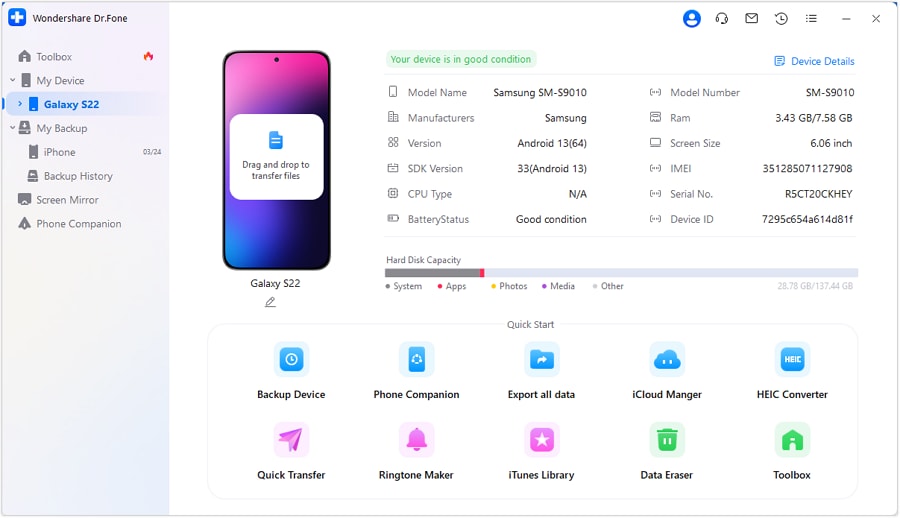
Step 2. Android to Outlook sync
Then, click “Contacts” under “Information” panel on the top. In the contact management window, choose the contacts that you want to export. Click “Export” button. When the drop-down menu pops up, you can either click “Export selected contacts to computer” or “Export all contacts to computer”. After that, click “to Outlook Express” or “to Outlook 2003/2007/2010/2013”. Then, the contract transferring begins. Be sure your Motorola Moto G73 5G is connected all the time.
As you see, apart from exporting Android contacts to Outlook, you can also copy contacts from Motorola Moto G73 5G to vCard, Windows Live Mail and Windows Address Book. If you have a Gmail account, you’re able to export Android contacts to your computer, and then backup these Android contacts to your Gmail account too.
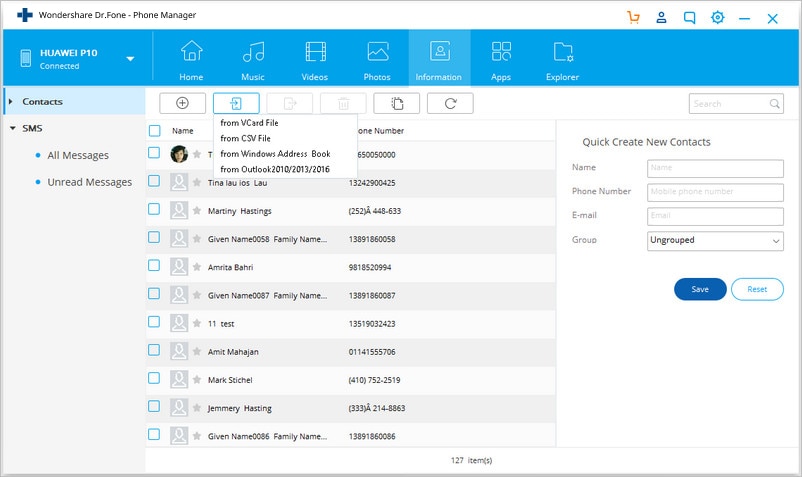
Now, download Dr.Fone - Phone Manager (Android) to have a try!
Also read:
- [New] Twitter Videos on Facebook The Transfer Guide
- [Updated] Microtones and Monikers Shorts' Sound Roles
- [Updated] Reviving Your Visual Story Adding Instagram's Flavor to Old Photos/Videos for 2024
- [Updated] Uniting Zoom Timings with Phone & PC Schedules Effortlessly
- Downloadless Video Sizing Application - Adjust Video Length and Quality Costlessly on the Internet
- Families and the World of Generative AI
- In 2024, How to Transfer Photos From Realme Narzo N53 to Samsung Galaxy S21 Ultra | Dr.fone
- In 2024, How to Transfer Text Messages from Xiaomi 13T to New Phone | Dr.fone
- In 2024, How To Unlock Honor Magic Vs 2 Phone Without Password?
- In 2024, Seamlessly Transfer Spotify Songs to YouTube with These Tools
- In 2024, Top 5 from Samsung Galaxy F14 5G to iPhone Contacts Transfer Apps and Software | Dr.fone
- In 2024, Top 5 from Vivo Y78+ to iPhone Contacts Transfer Apps and Software | Dr.fone
- In 2024, Two Ways to Sync Contacts from Tecno Spark 10 4G to Gmail | Dr.fone
- Norge'enas Skill Spurt - Daily Ten Minutes
- Solved Move from Motorola G24 Power to iOS not Working Problems | Dr.fone
- Solved Move from Samsung Galaxy M14 5G to iOS not Working Problems | Dr.fone
- Top 5 from Oppo Reno 10 5G to iPhone Contacts Transfer Apps and Software | Dr.fone
- Top 6 Ways to Transfer Text Messages from Vivo Y78+ (T1) Edition to Other Android Devices | Dr.fone
- Windows 11を使いPhotodisc DVD作りができない?!代わりにおすすめフリーソフトウェア
- Title: In 2024, How to Transfer Text Messages from Motorola Moto G73 5G to New Phone | Dr.fone
- Author: Emma
- Created at : 2024-10-08 21:04:45
- Updated at : 2024-10-13 19:59:23
- Link: https://android-transfer.techidaily.com/in-2024-how-to-transfer-text-messages-from-motorola-moto-g73-5g-to-new-phone-drfone-by-drfone-transfer-from-android-transfer-from-android/
- License: This work is licensed under CC BY-NC-SA 4.0.